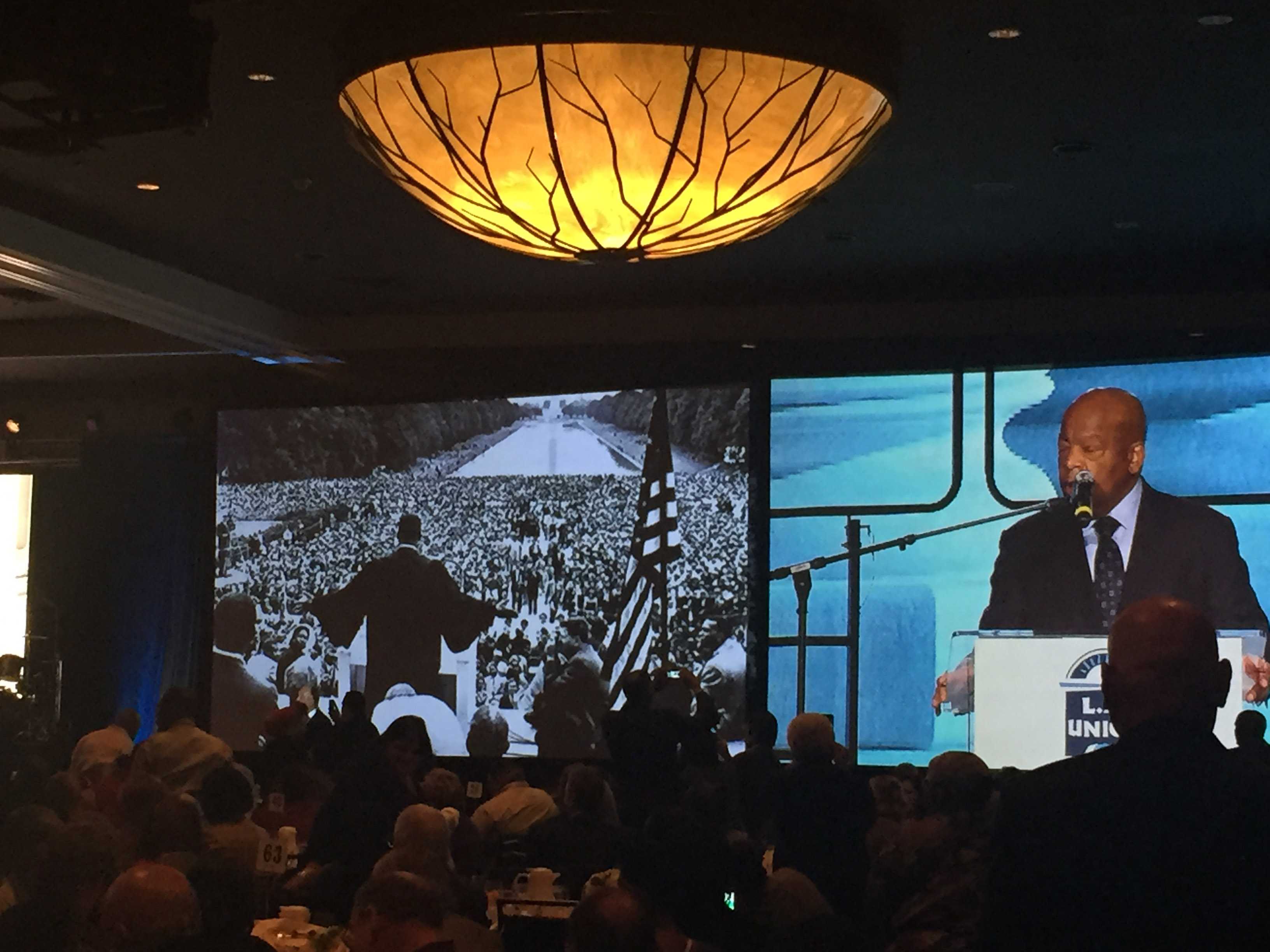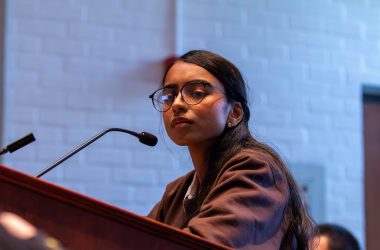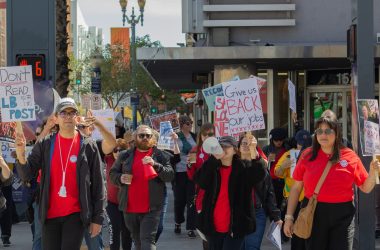Over 1,000 activists cheered on civil rights pioneer Congressman John Lewis in his address at the Martin Luther King, Jr. Labor Breakfast in Los Angeles Jan. 23.
The congressman spoke out against the racial disparities raging within the labor force and advocated for the disruption of the present system, calling upon the peaceful demonstrations of the ‘60s that paved the way for socioeconomic justice.
As one of the original “Big Six” leaders of the civil rights movement and founding members of the Student Nonviolent Coordinating Committee, Lewis was arrested more than 40 times for peaceful protests including sit-ins, Freedom Rides and the famous March on Selma. He remembered being bruised, beaten and bloodied countless times in his youth.
He also recalled his aunt telling him to be good and stay out of trouble.
“But one day in tenth grade, 15 years old, I heard of Rosa Parks.” he said. “I heard the words and leadership of MLK on the radio. The action of Rosa Parks and the words of Dr. King inspired me, defined a way to get in the way. I got in the way, I got in trouble.”
He urged the crowd of students, young workers, union members, congressmen and activists to organize and implement change as soon as possible. He also admonished racial inequalities in the workforce and the idle complacence of unresolved discrimination.
He rallied for wage increases and job security, for youth activism and voting power.
“Of the whole population of African-Americans in Los Angeles, over 50 percent are either unemployed, which means they have no job, or are underemployed, which means that they are employed, but not making enough wages to take care of themselves,” said Michelle Watson, 22, a community organizer for the Los Angeles Black Workers Center, a non-profit.
Watson and Brittany Watts, a 25-year-old intern from Cal State Long Beach, are both young workers at the LA BWC, which saw over 1,500 unanswered discrimination claims in California last year.
“I’m hoping that instead of pointing a finger, that we would be able to offer some solutions,” Watts said. “We need to put finger-pointing to the side and think of the bigger picture and mostly [deal] with getting [our] local city council members, senators, congressmen and government voting; we need to get their attention and have them pass laws and policies that can help us.”
The center is working to build a complaint resolution system in an anti-discrimination unit for African-American workers in LA this year, Watson said.
“We want to be the shirt that has your back,” she said.
Rusty Hicks, Los Angeles County Secretary-Treasurer of the American Federation of Labor and Congress of Industrial Organizations, supported the center’s contention.
“In 2016, we’ll help one another face some of the most challenging contract negotiations and Supreme Court decisions we’ve seen in a long time, but we’ll stand with our sisters and brothers who face an all-out assault from the 1 percent,” he said. “The 1 percent who wants to silence the voices of working people at the bargaining and negotiating table.”
Hicks backed Long Beach City’s mayor, Robert Garcia, in his initial decision to explore minimum wage increases for local workers, saying that both cities would work together to provide a strong model of support.
The AFL-CIO leader is also a strong advocate for the 5 percent salary increase demanded by the California Faculty Association. He said that he believes in the American principle that hard work deserves fair pay.
“It’s not just that they get what they want,” he said, “It’s that they get what they need. It’s that they get what they deserve. And so we’re going to stand with them in their struggle until they get a resolution.”
Several students turned out to support their professors and exercise their voice in government participation as well.
Oscar Estrada is a 25-year-old East Los Angeles College student and intern at the American Federation of Teachers.
“I believe that professors and teachers are one of the most valuable assets to this country and to the growth of not only the education of all the students, but that knowledge is power and it comes directly from professors,” he said.
Koatzin Cruz, 26, is a Cal State Dominguez Hills student and member of the Africana Studies Organization on his campus.
“As students we have the power to transform perceptions,” he said.“Even if you think that your vote is not going to matter, it is essential that you are present. Unless there’s a visual representation of support, there is no movement. Visual presentation highlights movements.”
Hicks agrees. “There’s an old saying that says, ‘Every generation has to win it on its own,’ which means John Lewis won it for his generation He won the right to vote for people of all colors,” he said. “It’s this generation’s time to deal with our issues today.”
As Congressman Lewis said to the audience who nodded in agreement, “We’re one house; we’re one family; we’re one people.”




